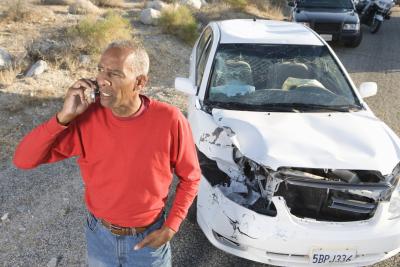If you are involved in a car accident in California, accident reports (traffic accident report SR1) are often required and must be submitted to the California department of motor vehicles (DMV). However, there are some specifics, such as the law's distinction between accidents and collisions, that must be taken into consideration before filing a report.

The California DMV specifies that an accident report (Form SR1) is required by law if the accident involves property damage of over $750 or if anyone involved suffers injury or death. If the accident meets any of these circumstances, "Each driver must make a report to DMV within 10 days, whether you caused the accident or not and even if the accident occurred on private property." If there is some doubt as to whether the damage exceeded $750 an agreement may be worked out between the two parties or their insurance providers on whether or not an SR1 form should be submitted.

However, the California DMV stipulates that actual traffic accidents are rare, and damage that occurs in traffic is generally caused by what it classifies as collisions: "An “accident” implies an unforeseen event that occurs without anyone’s fault or negligence. Most often in traffic, that is not the case." Basically, a collision occurs when there is contact between two cars and one of the drivers is at fault. Some common examples the DMV provides are driving too fast, unsafe turns, failure to yield the right-of-way, disobeying signs and signals, careless driving and driving on the wrong side of the road.

If a collision has occurred, the basic requirements are the same as for an accident. A form SR1 report must be submitted to the DMV, by you or your insurance provider, within 10 days if the damage caused by the collision exceeds $750 and if anyone is injured or killed. Insurance and personal information must be exchanged by the parties involved in the collision. Furthermore, "You (or your insurance agent, broker, or legal representative) must make a written report to the police or CHP (California Highway Patrol) within 24 hours of the collision if someone is killed or injured."

The California DMV adds that "If you hit a parked vehicle or other property, leave a note with your name, phone number, and address in or securely attached to the vehicle or property you hit. Report the collision to the city police or, in unincorporated areas, to the CHP." While not explicitly stated, this also holds true for accidents. Furthermore, "If your parked car rolls away and hits another vehicle, try to find the owner and report the incident to authorities as mentioned above." Depending on the circumstances, you should probably also contact your insurance agency.

The DMV also includes that "If you kill or injure an animal, call the nearest humane society, the police, or CHP. Do not try to move an injured animal or leave an injured animal to die." A collision or accident involving an animal may also prompt contact with your insurance agency.

If the collision or accident requires a report, you will presumably need to contact your insurance agency. Since this is the case, your insurance agent may very well decide to file the SR1 for you. This process is fairly standard and will save you the added hassle of acquiring and filling out the form. Your insurance agent is also already well familiar with the process and will ensure that no errors occur.
